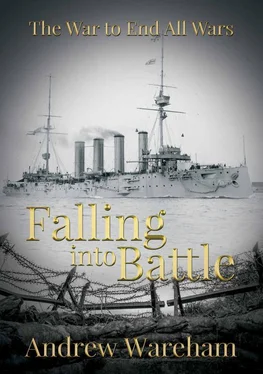“We have to make the best of them, Colonel. Good to know that some at least of the Terriers are worth having. I’ll make sure the General hears that. What’s the boy’s name?”
“Baker. He was Navy, a midshipman who couldn’t handle seafaring for being sick all the time but was determined still to serve, it seems.”
The story was sufficiently unusual for the staff officer to remember it and pass it on to his master.
Richard marched tiredly along, the slight uphill slope almost too much for him, buoyed up by knowing that it was the last quarter of a mile.
“Mr Baker!”
“Sir.”
Richard hauled himself to attention, straight-backed to accept Captain Platt’s orders. He had been beaten so often for slack posture as a midshipman that coming to attention was no more than a self-protective reflex.
“Good man! You have done well, Mr Baker. Take your half of the company and set them along the twenty yards of hedge and bank here and into the edge of the woodland. Send a pair of men to see what the terrain is, whether the woods are passable to formed troops.”
“Sir! Sergeant Grace – two good men who know what they are about to take a looksee through the woods. Corporal Ekins, your people to the side of the lane here; Corporal Abbott, hold the edge of the woodland. Further orders when I have had a look around myself.”
The orders were thin but adequate. The men positioned themselves along the lane and into the trees, looking out.
Richard scrambled up the three feet high bank and stared out over the hedgerow that crowned it.
He saw a countryside of shallow valleys and low and narrow hills, made by small streams cutting up the fields. There were hedges, five or six feet tall, mostly thorn and no more than a hundred yards apart and meandering, no straight lines at all. The woodland seemed to mark the beginning of a different sort of landscape of higher ground, rougher country, possibly less easy to traverse. He could not see whether the woods marked the beginning of a forest or simply a single, larger hill that could not be cultivated. He thought the soil changed from heavier clays to lighter sands on the hills to the west, but he was no farmer, knew little of such things.
The countryside to the front was rich, the fields all cropping heavily, wheat, barley and turnips mostly, immediately before harvest. There was some tall, dark rye, unusual to Richard’s eyes; the old-fashioned crop was no longer grown in England.
“Bad luck for the farmers, Sergeant Grace.”
“Be worse luck still if they haven’t run, sir. They won’t do very well with us firing over them.”
Richard shrugged – the tribulations of French or Belgian farmers were not his concern.
“Half the men on the firing line, half back and resting their feet, Sergeant Grace?”
“Yes, sir. There’s another stream a few yards downhill behind us, sir. I’ll organise parties to fill water bottles, sir. Get a brew-up going as well. Plenty of dry wood to hand, sir. The copse ain’t well managed, sir – lot of dead boughs and fallen stuff. Not like an English woods would be.”
“Get the tea going. How do we stand for rations?”
“Thin, sir. If the cookhouse don’t turn up, the men will be hungry in the morning.”
“I’ll speak to Captain Platt.”
Sergeant Grace nodded – that was all a lieutenant could do, other than turn a blind eye to any rabbit that might fall into a snare.
Captain Platt said he would address the colonel on the matter of rations.
“For the while, not much we can do, Baker. Keep a sharp eye out in front of us, there’s a good chap.”
Richard promised he would do so.
“Nothing to the right flank of the battalion, you know, Baker. Damned near a quarter of a mile empty before reaching the Hampshires. Don’t like having a flank up in the air. Still, not much we can do other than hold on here, keep the battalion anchored on the left, and all that.”
“Yes, sir.”
Sergeant Grace brought his two scouts to report on the woodland.
“Best they should tell you, sir.”
Richard glanced at the pair – Barnes and Woodman, two of the older Territorials, men in their late twenties.
The smaller of them, Woodman, swarthy, gypsy looking, saluted and launched into his spiel.
“The woods ain’t no more than ten acres, sir, up on a bit of a hill, as what you can see. Scrubby timber, sir. Not looked after proper. The streams come together at the bottom of the hill, the ones behind and in front of us, that is. They makes a bigger river between them what flows off to the northwest, sir, towards the sea. You might say it’s a letter ‘Y’, on its side, like, with us up in the open bit. There’s a village maybe a mile off along the river. I reckon as how the river is a canal from there, because of there’s some of they pithead wheels what you sees on coal mines there. Battalion was posted on summer camp to Lancashire two years back, sir, saw ‘em there. Full of canals, it was.”
“Right. A colliery village and a canal which will only be crossed at a bridge.”
“That’s it, sir. Can’t get cavalry through them pitheads, sir.”
“So then, you say they can’t come at us from the flank.”
“Foot soldiers could, sir, once they crossed the canal, but not horse.”
Richard thought for a few seconds.
“Sergeant Grace, put a small picket at the west end of the woodland, to watch for anything coming from the west, or crossing the canal and circling around behind us.”
Sergeant Grace approved of the order, set about carrying it out immediately.
“Well done, you two. Get yourself some tea before you go back to your platoon.”
Richard walked across to Captain Platt, reported on the terrain as he had discovered it.
“Jolly good, Baker. I’ll send my runner to the colonel. Small hills and a canal and mining villages to the north and west? Means we need watch to the northeast only. All we need is a cookhouse wagon and we shall be well set up, don’t you think?”
Richard did.
“Not very pleased with your other fellow, Baker. Young Smithers. Drooping about like a wet weekend in Wales – good for nothing!”
“He is young and not fit yet, sir. He will toughen up over the next few days.”
“Needs to, if he’s not to be sent back to the depot, Baker.”
“I’ll have a quiet word with him, tell him to buck his ideas up, sir.”
“Do that, if you please. You know the lad and can speak privately. Can’t meself without making it a bit of a disciplinary thing, you know, and don’t want to do that. Not yet, anyway.”
“Get off your idle arse, Smithers!”
“I say, Baker, that’s a bit hard, isn’t it? We must have marched a hundred and twenty miles in little more than a week! My jolly feet hurt so much I can barely stand on them! My stockings have got holes in them!”
“So have mine! Officers’ issue which aren’t meant for long marching. Put up with it! How will your father like it if you are sent back as unfit for duty? What will he say if you come back as a civilian with a dishonourable discharge?”
Richard knew exactly how his own father would react if he let him down a second time. He much preferred a future as a car salesman to being thrown out penniless.
“Well, I think it’s a bit much, asking this of us. It’s not as if we were real soldiers, is it?”
“The bloody Germans are, you silly little tit! They are somewhere out there, thousands of them, with rifles and artillery, and if you don’t get your men in order and ready to fight, then they will kill you and all the rest of us! Get off your good-for-nothing arse, boy!”
“But…”
“But bloody nothing! Make a man of yourself or go back and put a skirt on!”
Читать дальше












